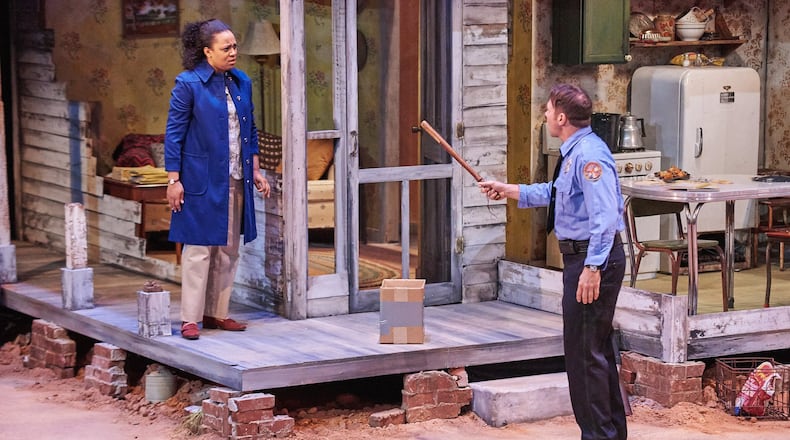Set in the period of upheaval in the South during the civil rights movement, Daryl Lisa Fazio’s “Split in Three” looks at the aftershocks of children who’ve been separated from their parents.
Whether the focus is a mother who died giving birth or a father who wandered off to start a secret life, this Aurora Theatre production straddles a line between domestic comedy, dysfunctional-family drama and social treatise.
Just as the U.S. Supreme Court issues a ruling ending Mississippi segregation in 1969, a pair of sisters living on the edge of squalor are shadowed by a mysterious visitor from up North.
First come hang-up calls. Then snippets of conversation are slyly cajoled or virtually beaten out of the intruder, who eventually reveals herself, and her “mingled seed” secret, in the flesh.
The sisters are Nola (Courtney Patterson), who wears heavy makeup, swills moonshine and stays out late, and Nell (Rhyn McLemore Saver), who mostly stays homes, bites her nails and looks for surrogate children to dote on.
On matters of race, it is a house divided: Nell is a staunch, unapologetic racist who believes that everything is fine the way it is; Nola cringes at the “n” word. Meanwhile, Nola is carrying on with Tuck (Travis Smith), a fumbling police deputy who is more preoccupied with getting a German Shepherd to ride in the front seat of his car than controlling the looming crowds of protesters and arsonists.
As played by Smith, Tuck is an ineffectual Barney Fife type with a hilarious arsenal of facial expressions that convey social awkwardness disguised as swagger. In moments of stress, his eyes bulge and his nostrils quiver, to brilliant effect.
Into this comic world of bickering siblings and inept suitors comes Clifford (the young TV and film actor Elijah Marcano), a boy on a bike who lives next door and is troubled by the violence swallowing up the town. We learn Clifford, angelic, saintlike and finely played by Marcano, is, like Tuck, weighed down by tragedy and deeply misses his mother. All this makes him a convenient object for the affections of Nell, who has been abandoned by her husband.
While gunshots crackle and racist slurs are heard in the distance, Penny (Falashay Pearson), arrives, the color of her skin further upsetting the delicate equilibrium.
After the disappointing "Freed Spirits" at Horizon Theatre last fall, Fazio delivers an aching study of racism as it spills from the streets into interior lives of a scattershot family. Director Justin Anderson calibrates the action with a delicate touch, evoking a place that is infused with a sense of melancholy and impending disaster.
Jamie Bullins’ approximation of the family’s shanty is masterful, down to the dried-up weeds that grow out of the tumbling bricks supporting the porch. Kendra Johnson’s costumes are true to the period and the characters’ social status.
In sum, this is a lovely play, nicely written and staged. Like William Inge, Fazio is quite good at drawing a scene that seems ordinary, then slowly revealing its crumbling foundation.
Still, there are a few too many family misfortunes lurking rather Faulkner like at the margins, and for a good bit of the second half I felt as if I were waiting for some confrontation that never happens, some seam that never rips.
For an examination of social upheaval, “Split in Three” feels remarkably placid. And yet, as a story that ultimately hints at redemption and healing, the working out of the complicated knots of family ties, that is an asset and a blessing.
Theater review
“Split in Three”
Grade: B
8 p.m. Tuesdays-Saturdays. 2:30 p.m. Saturdays and Sundays. $20-$55. 10 a.m. matinee May 24 $16-$26. Through May 26. Aurora Theatre. 128 East Pike St., Lawrenceville. 678-226-6222. auroratheatre.com, 678-226-6222.
Bottom line: When racism comes home
About the Author
Keep Reading
The Latest
Featured


